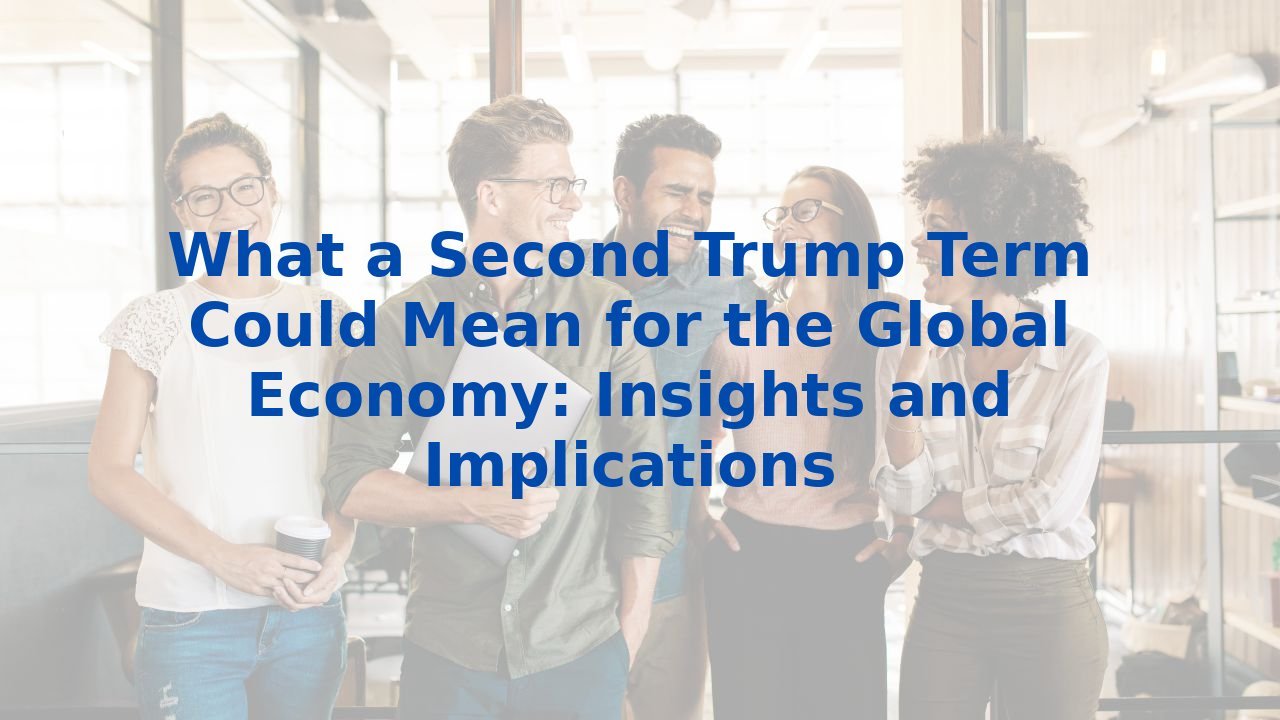What a Second Trump Term Could Mean for the Global Economy: Insights and Implications
What a Second Trump Term Could Mean for the Global Economy: Insights and Implications
The prospect of a second Trump term in office raises numerous questions about the global economic landscape. Policies on trade, taxation, and international relations could shift dramatically, and the integration of AI into business processes could play a pivotal role in navigating these changes. As organizations grapple with the evolving economic environment, it’s essential to understand how AI can enhance operational efficiency and improve processes across various sectors.
Understanding Business Processes in a Changing Economy
Businesses operate through a series of interconnected processes. These processes involve everything from supply chain management and customer relationship management to financial performance and employee engagement. In the midst of economic uncertainty, the effectiveness and agility of these processes determine a company's competitive edge.
During a second Trump administration, potential changes in trade regulations and economic initiatives could introduce volatility. Organizations will need to adapt quickly to stay ahead. This is where artificial intelligence (AI) can become a game changer.
The Role of AI in Enhancing Business Processes
AI can revolutionize critical business processes by optimizing decision-making, improving accuracy, and increasing speed. For example, predictive analytics can help organizations anticipate market demands, allowing them to adjust their production or service offerings in real-time. This capability is particularly vital in dealing with supply chain disruptions, which could arise from new tariffs or trade agreements.
Operational Efficiency through AI
Operational efficiency is at the heart of any successful organization. AI technologies can streamline workflows by automating repetitive tasks, enabling teams to focus on high-priority initiatives. For instance, in customer service, AI chatbots can handle routine inquiries, freeing up human agents to tackle more complex issues that require a personal touch.
Moreover, AI can enhance data analysis, providing organizations with deep insights into consumer behavior. This data-driven approach empowers management to make informed decisions, adapt to changing conditions swiftly, and deploy resources more effectively.
The Benefits of Employee Training for AI Integration
As organizations increasingly embrace AI, the importance of training and skilled personnel becomes paramount. Investing in employee training not only equips them with the necessary technical skills but also fosters a culture of innovation. This culture encourages teams to explore AI's potential fully and leverage it to enhance their specific workflows.
Organizations that prioritize continuous learning stand to gain an advantage. For instance, specialized training programs in AI can prepare employees to tackle sector-specific challenges, whether in finance, marketing, or operations. This adaptability is crucial in uncertain economic climates, where agility can differentiate between success and failure.
Elevating Team Skills
The successful integration of AI hinges upon having a workforce equipped with the right skills. From understanding AI algorithms to interpreting analytics, comprehensive training can transform employees into knowledgeable assets. By elevating team skills, organizations can harness AI's full potential and navigate the complexities of a shifting global economy with confidence.
Preparing for the Future
As we look toward the future, the implications of a second Trump term present both challenges and opportunities. Embracing AI can mitigate risks and unlock new avenues for growth. However, it requires a proactive approach to training and development.
Organizations need to assess their current capabilities and identify areas where AI can make the most impact. Are your teams ready to leverage AI in their daily processes? Investing in training programs ensures your workforce is equipped to adapt and thrive in an evolving landscape. Explore options for comprehensive AI training that can provide your organization with the tools it needs for long-term success.
Conclusion
The intersection of a second Trump term and the integration of AI into business processes will undoubtedly shape the future of the global economy. Organizations that proactively enhance their processes through AI and invest in employee training will be positioned to navigate uncertainty and harness opportunities effectively. As we embrace new technologies and adapt to changing policies, the potential for innovation and elevated efficiency is limitless.
Your organization can embark on this transformative journey by exploring all available AI training programs tailored to your workforce needs. Discover how training can equip your team and ignite success!
As we stand at this crossroads, the necessity for foresight, preparation, and adaptability has never been more pronounced. The future awaits—let's navigate it with intelligence and insight.



